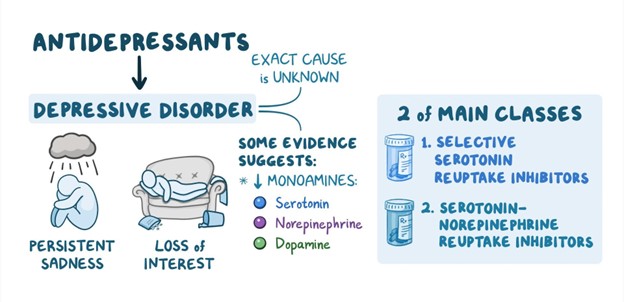A nurse is caring for a client who has major depressive disorder and was prescribed citalopram 2 weeks ago with a planned dosage increase 1 week ago. The client reports having an improved appetite, but still feels very depressed and is still having trouble sleeping. Which of the following actions should the nurse take?
Speak to the provider about adding an MAOI to the current medication regimen.
Explain that antidepressants often take several weeks to be fully effective.
Tell the client that the provider will need to change citalopram to a different medication.
Recommend a sleep study be done on the client
The Correct Answer is B
This action might be premature. MAOIs (Monoamine Oxidase Inhibitors) are a class of antidepressants with specific dietary and medication interactions. They are typically considered when other classes of antidepressants have not been effective. It's important to exhaust other options before considering a switch to MAOIs.
B. Explain that antidepressants often take several weeks to be fully effective:
Explanation: Correct Answer. This is an appropriate response. Antidepressants, including citalopram, can take several weeks to show their full therapeutic effects. It's common for some symptoms to improve before others. Educating the client about the delayed onset of action is important to manage their expectations.
C. Tell the client that the provider will need to change citalopram to a different medication:
Explanation: It might be too early to consider changing the medication after just two weeks, especially since the client reports an improved appetite. Changes in dosage or medication should ideally be discussed with the provider after an adequate trial period.
D. Recommend a sleep study be done on the client:
Explanation: While sleep problems can be associated with depression, it might not be the most appropriate next step based solely on the information provided. It's more important to address the ongoing depressive symptoms before focusing solely on sleep.

Nursing Test Bank
Naxlex Comprehensive Predictor Exams
Related Questions
Correct Answer is ["2"]
Explanation
The nurse is preparing to administer benztropine 2 mg IM every 12 hours. The concentration of the available benztropine is 1 mg/mL.
To calculate the volume (mL) of the medication needed for the prescribed dose, you can use the formula:
Volume (mL) = Dose (mg) / Concentration (mg/mL)
Plugging in the values:
Volume (mL) = 2 mg / 1 mg/mL = 2 mL
So, the nurse should administer 2 mL of benztropine 1 mg/mL for each dose. Since we're looking for a whole number, we round to the nearest whole number, which is 2 mL.

Correct Answer is B
Explanation
A. Helping the client identify positive personality traits.
While addressing self-esteem and positive personality traits is valuable for the client's overall well-being, it is not the immediate priority during the detoxification phase. Ensuring physiological safety comes first.
B. Providing for adequate hydration and rest.
Explanation: The detoxification process from alcohol can result in withdrawal symptoms that range from mild discomfort to severe medical complications. Adequate hydration and rest are essential during this phase to manage withdrawal symptoms and prevent potential complications such as dehydration, electrolyte imbalances, and seizures. Maintaining the client's physiological stability is of utmost importance.
C. Educating the client about the consequences of alcohol misuse.
Providing education about the consequences of alcohol misuse is important for the client's understanding and motivation for recovery, but it's not the primary concern during the initial detoxification phase.
D. Confronting the use of denial and other defense mechanisms.
Addressing denial and defense mechanisms is important for therapy, but it might not be the immediate priority. Physiological stabilization through hydration and rest takes precedence in the detoxification phase.
Whether you are a student looking to ace your exams or a practicing nurse seeking to enhance your expertise , our nursing education contents will empower you with the confidence and competence to make a difference in the lives of patients and become a respected leader in the healthcare field.
Visit Naxlex, invest in your future and unlock endless possibilities with our unparalleled nursing education contents today
Report Wrong Answer on the Current Question
Do you disagree with the answer? If yes, what is your expected answer? Explain.
Kindly be descriptive with the issue you are facing.
